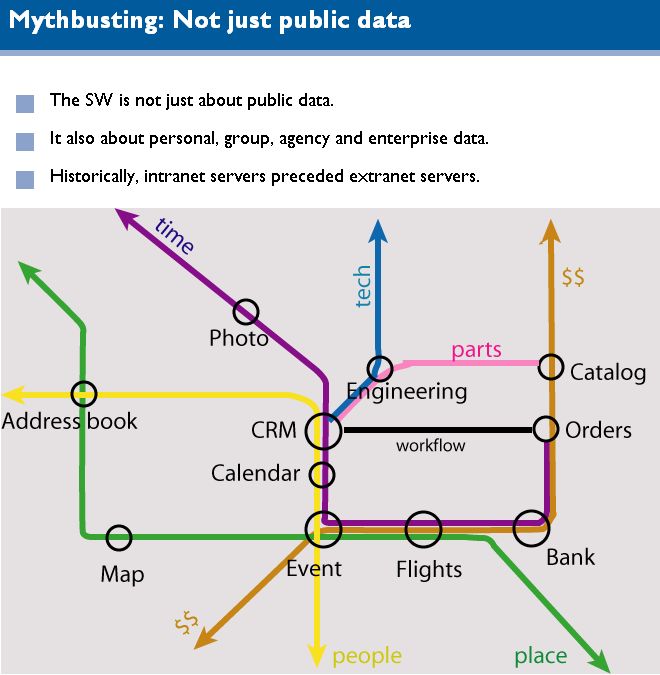
Workshop IntraWebs 2006 - Position
Fabien Gandon and
Rose Dieng-Kuntz,
INRIA Acacia Research TeamPrincipleIntranets are networks used internally in organisations to facilitate communication and access to corporate information. Internet protocol suite and tools are used to build intranets and especially the Web application layer to provide organisations with integrated and unified interfaces to corporate 'legacy' data and information systems.Very often the term intranet refers only to the most visible service i.e. the internal web sites. In fact for a large portion, intranets are solely relying on World Wide Web software. More than just a play on the word 'Internet', the word intranet was formed from the prefix intra-, meaning "inside, within", plus net, an abbreviation of 'network'. Likewise, 'intraweb' is formed from the prefix intra- plus web and thus refers to web sites that are only accessible to people within a specific group, organization or community. Nowadays, most large companies have intrawebs as part of their internal information system. Security and privacy aspectsBeing built on the same technology, intranets can offer similar services within an organisation to those provided by the Internet outside it but: (1) they are not necessarily connected to the Internet and (2) their services can tap into internal organisation resources.With the advent of mobile computing, the notion of internal versus external network is no longer physical; intranets and extranets often make use of Virtual Private Networks (VPN). The main raison d'être of the separation between intranets and the Internet is to preserve the confidentiality and security of the corporate information system. These mini-Internets are owned and managed by companies and enable these corporations to share their resources with their employees without confidential information being made available on the public Internet. Web sites running on an intranet look and act just like any other Web sites, but the firewall surrounding the intranet prevents any unauthorized access thus creating a private web. In a B2B context a company might grant limited access to its intranet to other companies; this is known as an "extranet". Intranets, extranets and Internet are realms of security created for dedicated cooperation and ordered by openness. More generally, access restrictions are of three kinds: from the outside to the inside (through firewalls and VPN), from the inside to the inside (user profiles and access levels), from the inside to the outside (e.g. web filtering).  Knowledge management and computer-supported cooperative workMany companies maintain such mini private Webs that contain information only of use to their employees: organisational structure, corporate templates, HR resources, forms, directory, agendas, news, policies, rules, regulations, help files, project descriptions, expert annuary, partnerships with external companies, law information, etc. Intrawebs offer a safe place for employees to publish information that improves workflow but also online interfaces with corporate 'legacy' data, information systems and shared applications.In fact intrawebs are becoming a privileged means for knowledge management to acquire, facilitate the access, share, and reuse knowledge in order to foster creation of new knowledge and organisational learning. As they grow, many intrawebs need a search facility that allows users to find specific information more easily. Finally, we mentioned that intrawebs were used to limit access to the web (e.g. web filtering) but inversely they can be used to facilitate it. The organization which sets up an intranet is a community and may host many sub-communities of interest that can maintain collective directories, shared bookmark repositories, etc. Thus an intranet is not necessarily only an internal portal to internal resources, it can also provide efficient and focused portals to the world "wild" web. Economies of scale both in financial and cognitive termsReliance on cheap or free software enabled Intranets to conquer corporate computing. Most internal networks use Internet protocols and therefore the same technology stack can be used above. Relying on technologies developed for the Internet, internal company networks benefit from widely-used and supported techniques that are simple and inexpensive to build and maintain compared to proprietary solutions. The same concepts and technologies of the Internet, such as clients and servers running on the Internet protocol suite, are used to build an intranet. In addition to an economy of scale in terms of building, deployment and maintenance costs, one can also recognize an economy of scale in terms of cognitive workload: reusing the same technologies and tools as the World Wide Web to build an organization-wide web of internal documents makes it familiar and easier both for developers and users. The same server technologies are used to distribute information, the same browser clients are use to access it, corporate information and application present the same uniform hypertext interface.Web applications for the company and corporate applications on the webHistorically, many evolutions of the world-wide web have been adopted and used in internal webs. Just like the web evolved from a text-based system to a web of multimedia and online services, intrawebs now include multimedia resources and, for instance, corporate forms moved from online static copies to dynamic front-ends of web applications directly linked to the corporate information system. Even latest web tools meet application scenarios on corporate webs: wikis can be used to edit and maintain corporate documents and directories in a very simple way, blogs can be used for news and technological watch, web services are being used to allow enterprise application integration and workflow management, semantic web frameworks are used for information and data integration and exchanges for instance to materialize corporate memories as corporate semantic webs, etc.Intrawebs are webs dedicated to the community of a corporation. Being on a private network of the company, intrawebs can include a whole family of applications that could not be made available on the public web for confidentiality reasons: corporate applications. The corporation is an existing community that needs to setup and maintain collaboration to attain professional objectives. Web technologies are used to propose shared application supporting communities of practice, of interest, and more generally speaking, knowledge management. They can support collaborations: synchronous communication, expert matching, internal FAQ, collaborative document edition, case-based memories, project management, workflows, etc. Within a company the existence of such community and of its shared professional interests makes the intraweb a selected place to develop and experiment new web-based solutions. Historically there has always been a synergy between world-wide web evolutions and intra-webs experiments. Many evolutions of the world-wide web have been adopted and used in internal webs and, vice-versa, many local initiatives on intrawebs turned out to be seeds of new web applications. Slide from Sir Tim Berners-Lee at ISWC 2005 : 
|